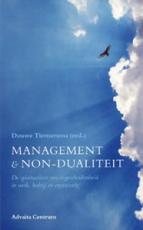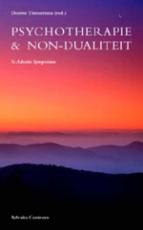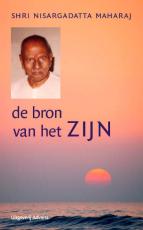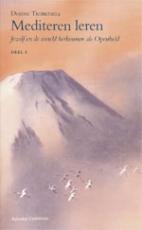Advaita Post 11-08 - In your authentic open-being you are infinite...
Volume 11 No 8 (April 27, 2010)
--- In your authentic open-being you are infinite; so then you release everything of others and of yourself into the infinite ---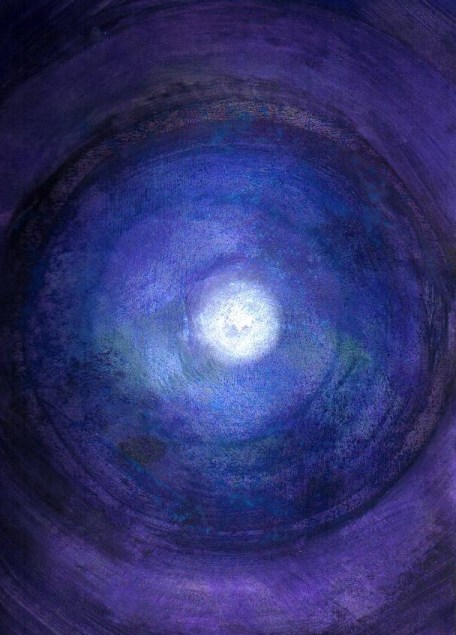
What is your origin, what is your destination?
Spring Experience (2)
From an talk on March 17, 2010 in Gouda
[Too bad, the full flowering of the spring experience (see Advaita Post #11-7) so often stops.]
Aren't you bound by your genes?
What do you get from that belief? Here we are staying with your authentic experience. Do you get that?
That you want to perpetuate life, in others too, and so you do research and acquire knowledge.
Knowledge is great, but never let it gain precedence. The most important context remains the authentic experience. To the extent that doctors stay stuck in their medical thinking, problems can arise in its application to human beings. Always see for yourself how it is with your authentic experience. When it's there, you confirm that it's direct, that there is no distance between yourself as observer and the observed. There's nothing in between. Therefore it is a being-experience. If you go along with that experience, everything really opens up.
The authentic experience can take place anywhere. We were just talking about the budding of nature. Thus, the start is: enjoy it. If you can enjoy it, what does that enjoyment mean? If you immediately start thinking from all your biological knowledge, the enjoyment falls short. If you keep it just on the "I think it's great and therefore important", the enjoyment continues to be relative. No, only when the enjoyment continues by itself, the 'I' and the 'I think' disappears. Again, if you have an idea of an 'I' on one side and something 'other' on the other side, which you enjoy, then the enjoyment is short lived. Because the 'I' that experiences itself is in time, the enjoyment is also in time. Moments later it's gone. Then the circumstances change and the 'I' finds other things that it wants to give its attention to. No, if the enjoyment allows itself to unfold, it's direct, it's one hundred per cent; there is no separation between yourself and that which you enjoy. It's without time, free of conditions. There remains just enjoyment as an original being-experience without a specific structure. That is universal joy.
You say it in a way like, "why don't you all see that!"
Isn't it a shame that through your thinking you close yourself off from a great opportunity for enlightenment? Everyone goes outside and finds it beautiful. Now, it's that simple. Nice, that you can also locate it in principle. If you have recognized something about that when you step outside, then just let it happen that you disappear into the cosmic enjoyment.
See the possibility and see what the essence of it is. Can that essential continue?
Thus the problem is the reflexive state of mind that you have as an adult. That thinking leads you astray. I had it last week, for example. Everything was just about a perfect dance, but then I immediately thought: "This is it, and I must keep it that way."
That was the serpent, Satan, who spoke. Then you fall out of paradise.
My youngest child has the exact open experience. Only he doesn't know it, and so he stays in it quite comfortably. But our problem lies in our thinking.
So the problem can only disappear from your conscious situation. Because you have knowledge of the open being-experience and the problems that occur whenever thinking pops back up, you can continue to stay focused on that authentic experience. That is possible from your consciousness, because you have knowledge of how the mechanism works. If then you still go along with all sorts of judgments and thoughts, you recognize it. Then you know what happens and you can direct yourself once again in a conscious manner onto that open sphere of experience. Stay right there. Then that other may still be whining somewhere out there in the background, but eventually it goes away. What matters is that you hold onto the right orientation. The internal and external forces that work upon it and which you want to restrict through the forms of concepts and ideas, can't continue, just because you don't go there. It requires great clarity, but it's worth it.
It also demands a certain kind of innocence that you have to keep in position one way or another.
Yes, an innocence that you - given the precarious state of mind in adults - apparently need to promote in a deliberate manner. In the book 'Management and non-duality' I have spoken about "conscious naiveté". You have an original naivety with children who are not aware of it. When adults appear to be naive, people say, "Don't be so naive."
It's often said about me.
See how valuable it is to stay naïve in a conscious way. You'll certainly notice that sometimes you get caught by others, but in general, that is far less important than continuing to remain in the open sphere. And that is what's most important, just stay naive, that is, open, egoless, in a conscious manner. For the rest, let them figure it out for themselves.
If you are aware of your open direct experience, you'll see very quickly what happens. You no longer interact in the old way. You let go of the impulses and ideas that you would use against the various forces, being assertive, etc.. That's totally no longer necessary. No, there is a reversal of the whole situation, a totally different perspective, since you can remain in the open sphere of experience in a conscious manner. Then you see with great clarity that others make things unnecessarily complicated and want to involve you in it. You see how much they are trapped in restrictive concepts. From the limited thinking consciousness people say disapprovingly: "He is a little naïve". But, once there is that reversal of perspective, you see how it really is in regards to being limited and unlimited.
I heard the story of a married couple where the woman was very open and the man wanted to be the most important. The woman said, "Okay, then, you decide." So she did things according to her place. Look at the orientation: you can have a clash of egos, but when it has become very open, then there is hardly any self-interest any longer. The one may then decide and regulate everything in the outside world and people might say: "She lets herself be used." No, absolutely not. This woman saw through it and said, "Go ahead, never mind, because I love you." Wonderful right? After her death, her diary revealed just how enlightened she really was in her life.
Through the recognition you receive more and more knowledge of what it means to stay more open and you also receive the confirmation that it can. Just have trust in it, stay naively aware. Most people are afraid of this: "then I would be contributing to my own foolishness". The point is that you return to your own self which appears to be universal. The stability of self-being appears to be a universal stability. Compare that with the situation in which you're looking for stability through external appearances, in your behavior, your workplace personality, in your physical appearance. See how unstable that is. Machos are the most unstable people. Isn't that right?
If I am aware of the openness and the other isn't, it's difficult.
If you find it difficult, then apparently you're not quite open.
I often see in others things that are so stupid.
That's not a real problem. Grant the other person his stupidity.
Isn't the authentic openness infinite? So then release into the infinite everything of others and of yourself. If one person is open and the other still has all kinds of 'I'-tensions, for the open one is there still a problem? Just stay in that openness.
A continuing spring greeting to all,
Douwe Tiemersma
Er is geen tweeheid
als je ontspannen bent
in zelf-bewustzijn
is dat duidelijk.
Boeken
Douwe schreef en redigeerde gedurende zijn leven boeken. Via onze uitgeverij zijn deze nog verkrijgbaar.
